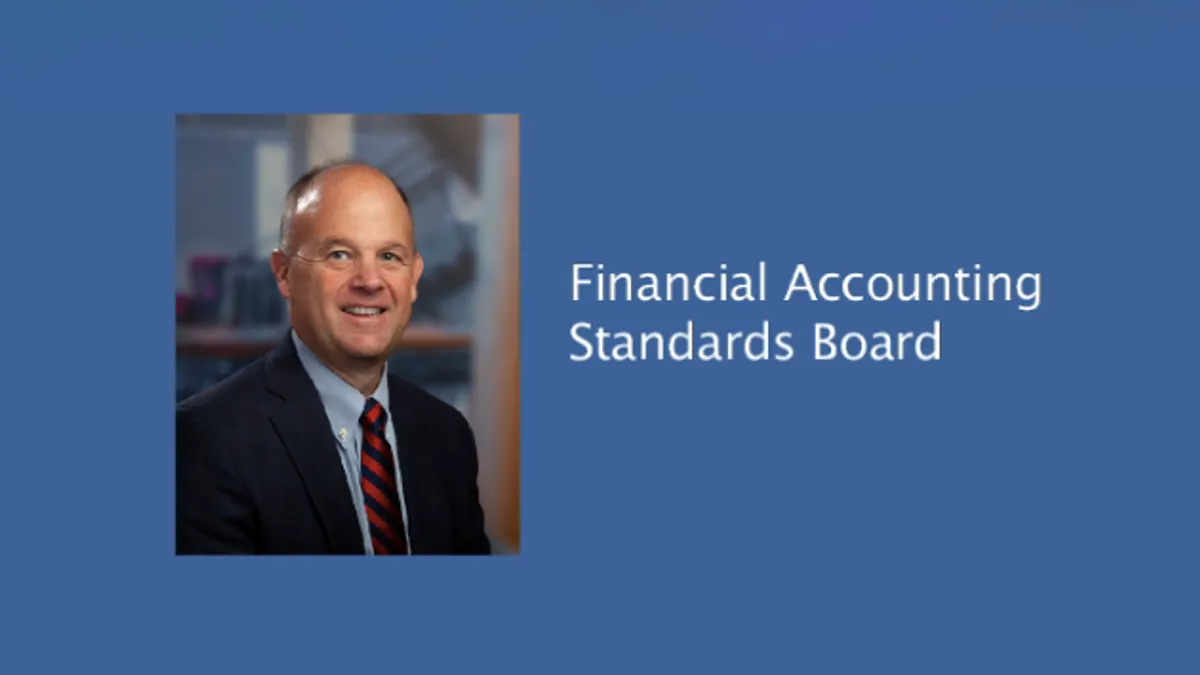Dive Brief:
- The Financial Accounting Standards Board (FASB) has appointed Richard Jones, chief accountant at Ernst & Young, to be its next chair.
- Jones starts July 1, 2020, replacing Russell Golden, the organization's head since 2013.
- "Rich Jones brings together all of the important qualities we were looking for in FASB’s next leader,” said Charles Noski, chair of the Financial Accounting Foundation, which oversees FASB.
Dive Insight:
FASB was established in 1973 as an independent organization to write financial accounting and reporting standards for public and private companies, and nonprofit organizations that follow generally accepted accounting principles (GAAP).
Jones has spent his entire career at Ernst & Young. He joined in 1987 following his graduation with a B.S. in accounting from the State University of New York, Binghamton.
“I am both excited and humbled by this opportunity,” Jones said. “I have long regarded the FASB as a fascinating and vital player in the financial reporting system."
Rocky rollouts
FASB has faced criticism for its handling of recent changes in standards. Moody's knocked its decision to delay the rollout of lease accounting changes for privately held companies and nonprofits. The changes require organizations to disclose operational leases on their balance sheet, both as an asset and a liability, in the same way capital leases are treated. The change took effect for publicly traded companies at the beginning of this year.
FASB said the delay was needed to give organizations more time to meet the new standard, which can be time consuming because the leases are often embedded in contracts and hard to identify.
Moody's said giving "adoption laggards" more time hinders the credit analysis process by making it hard to compare public and private companies. "Such delays will hurt reporting transparency, affecting a swath of ... corporations across different sectors," Moody's analysts Kevyn Dillow and Dean Diaz said.
FASB was also hit for its rollout of changes to the way banks record expected future losses on loans.
Under FASB's current expected credit loss (CECL) standard, banks use what's known as the incurred-loss method, which measures expected credit losses over the life of a loan at the time it's recorded based on historical experience, current conditions and forecasts. Under the change, banks recognize expected credit losses as soon as loans are issued.
Rep. Blaine Luetkemeyer, R-MO, ranking member of the House Financial Services Committee, took a swipe at the organization for not getting banks' input prior to making the change. In October, he introduced a bill to subject the organization to the same procedures as federal agencies when they issues regulations. The bill is unlikely to pass but it sends a message to FASB that it's under the spotlight.
"This bill will not take away FASB's independence, but it will force them to perform the due diligence they have proven unwilling to do," Luetkemeyer said in a statement.
Jones said he's looking forward to joining FASB board members next year to lead the organization. "The independent standard-setting process is a national asset and is foundational to our robust financial markets," he said.












